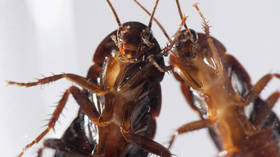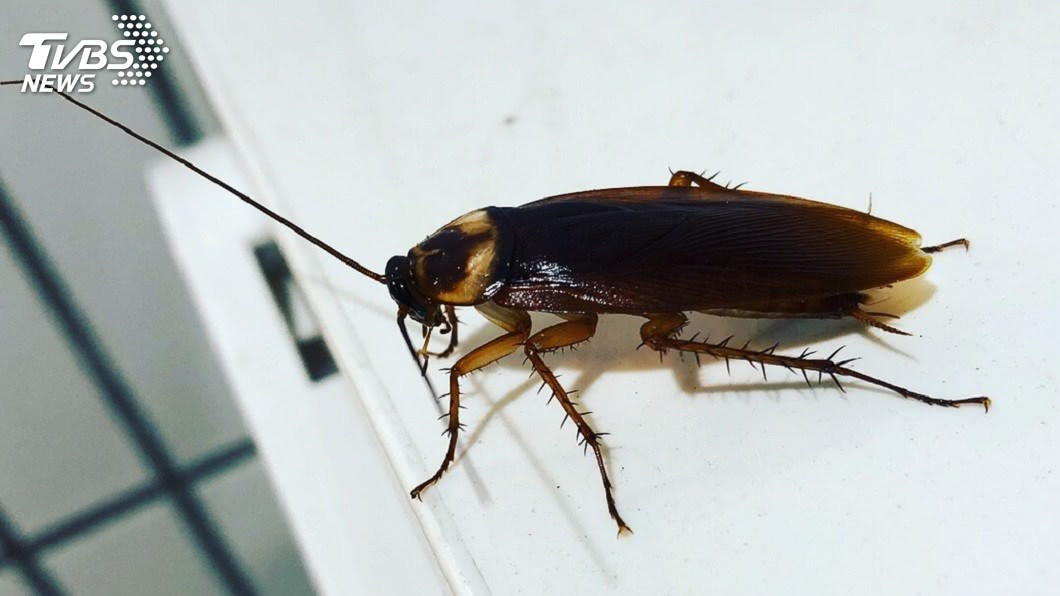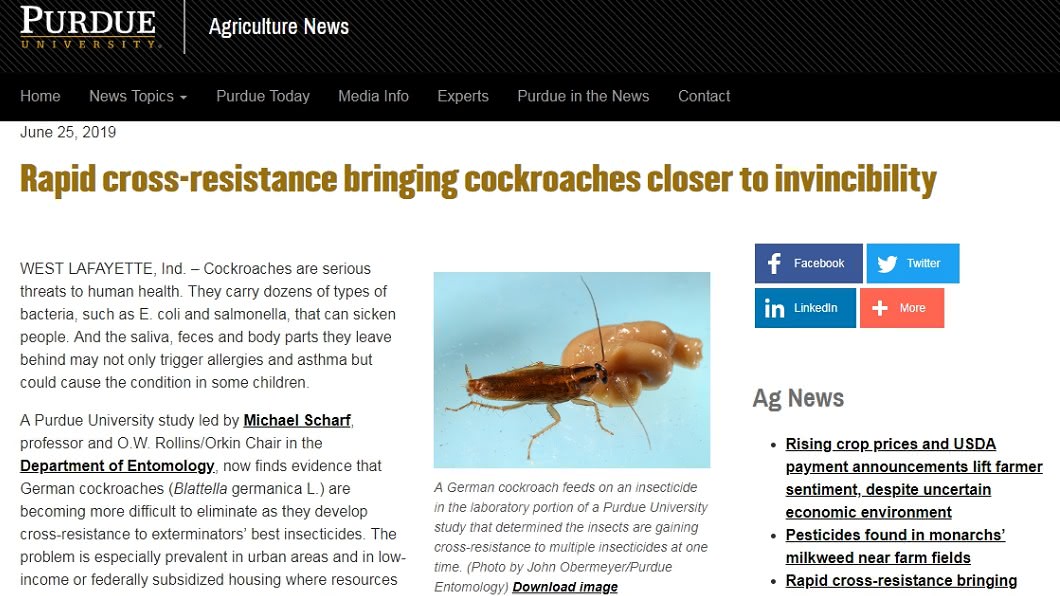- Joined
- Aug 8, 2008
- Messages
- 6,070
- Points
- 83
https://www.rt.com/usa/463250-cockroaches-evolve-resistance-pesticides-study/
Cockroach ‘superbugs’ evolve to resist pesticides in ONE GENERATION, study finds
Published time: 3 Jul, 2019 02:19
Get short URL

© Global Look / Robin Loznak

Cockroaches will soon be impossible to kill with standard pesticides, as they can develop cross-resistance to poisons they’ve never encountered within a single generation, an ominous new study has found.
German cockroaches – the small, quick-scurrying type whose traces can be found in 85 percent of US urban homes – are rapidly becoming impervious to pesticide chemicals, developing cross-resistance to a variety of insecticides within a single generation, a study published in Scientific Reports has demonstrated. And even the researchers who conducted the experiment are creeped out by the evolutionary capabilities of the ubiquitous six-legged pests.
Also on rt.com Duterte speech unexpectedly interrupted by giant COCKROACH (VIDEO)
“We didn’t have a clue that something like that could happen this fast,” Michael Scharf, chair of the Entomology Department at Purdue University and co-author of the study said in a statement last week. “Cockroaches developing resistance to multiple classes of insecticides at once will make controlling these pests almost impossible with chemicals alone.”
Cockroach populations targeted with multiple chemicals also tended to spread out, infesting adjacent apartments to those being tested – so not only did total population numbers not decrease as they were expected to, but entire buildings fell to six-legged armies once content with smaller domains. Only when the roach population had next to no resistance to the chosen insecticide, and only that insecticide was used, were the researchers able to exterminate the persistent creatures.
via GIPHY
While exterminators frequently rotate the types of insecticide they use on the job in case some roaches in a population are resistant to one class of chemical, the experiment’s results indicate they will have to step up their game enormously if they want to have any impact on Blattella germanica. Scharf, whose lab is partially funded by pest control company Orkin, recommended traps, vacuums and improved sanitation alongside frequently rotated chemical pesticides, apparently unwilling to acknowledge that the lowly cockroach had all but outsmarted the arrogant two-legger in terms of chemical resistance. He even blamed “widespread availability of ‘over-the-counter’ consumer products” for increasing pesticide resistance among cockroach populations – even though resistance was observed to all insecticides, not just the “old-school” pyrethroid types that have been producing pesticide-resistant cockroaches since they came into fashion in the 1950s.
Also on rt.com Europe at major threat of INSECT-BORNE tropical diseases, scientists warn
Female German cockroaches may lay up to 400 eggs in a lifetime, and the insects’ 60-day lifespan makes for a quick-evolving species. They thrive in human habitats - particularly where food is prepared – and rely on humans for shelter in cold climates, hospitality they repay by spreading disease through their feces and shed body parts and triggering allergies in susceptible people. They also have wings – but at least the humans can take some small comfort in knowing the species “very rarely flies,” according to Orkin.
Like this story? Share it with a friend!
Cockroach ‘superbugs’ evolve to resist pesticides in ONE GENERATION, study finds
Published time: 3 Jul, 2019 02:19
Get short URL

© Global Look / Robin Loznak

Cockroaches will soon be impossible to kill with standard pesticides, as they can develop cross-resistance to poisons they’ve never encountered within a single generation, an ominous new study has found.
German cockroaches – the small, quick-scurrying type whose traces can be found in 85 percent of US urban homes – are rapidly becoming impervious to pesticide chemicals, developing cross-resistance to a variety of insecticides within a single generation, a study published in Scientific Reports has demonstrated. And even the researchers who conducted the experiment are creeped out by the evolutionary capabilities of the ubiquitous six-legged pests.
Also on rt.com Duterte speech unexpectedly interrupted by giant COCKROACH (VIDEO)
“We didn’t have a clue that something like that could happen this fast,” Michael Scharf, chair of the Entomology Department at Purdue University and co-author of the study said in a statement last week. “Cockroaches developing resistance to multiple classes of insecticides at once will make controlling these pests almost impossible with chemicals alone.”
This is a previously unrealized challenge in cockroaches.
One experiment in which 10 percent of cockroaches started off resistant to a particular pesticide actually saw populations grow over the six months the researchers sprayed, a disconcerting result in itself. But it was the multi-chemical experimental groups that really caused a stir – cockroaches who survived treatment with one insecticide developed immunity not just to that chemical, but to other chemicals they hadn’t even been exposed to – increasing their resistance “four- to six-fold in just one generation,” Scharf marveled.Cockroach populations targeted with multiple chemicals also tended to spread out, infesting adjacent apartments to those being tested – so not only did total population numbers not decrease as they were expected to, but entire buildings fell to six-legged armies once content with smaller domains. Only when the roach population had next to no resistance to the chosen insecticide, and only that insecticide was used, were the researchers able to exterminate the persistent creatures.
via GIPHY
While exterminators frequently rotate the types of insecticide they use on the job in case some roaches in a population are resistant to one class of chemical, the experiment’s results indicate they will have to step up their game enormously if they want to have any impact on Blattella germanica. Scharf, whose lab is partially funded by pest control company Orkin, recommended traps, vacuums and improved sanitation alongside frequently rotated chemical pesticides, apparently unwilling to acknowledge that the lowly cockroach had all but outsmarted the arrogant two-legger in terms of chemical resistance. He even blamed “widespread availability of ‘over-the-counter’ consumer products” for increasing pesticide resistance among cockroach populations – even though resistance was observed to all insecticides, not just the “old-school” pyrethroid types that have been producing pesticide-resistant cockroaches since they came into fashion in the 1950s.
Also on rt.com Europe at major threat of INSECT-BORNE tropical diseases, scientists warn
Female German cockroaches may lay up to 400 eggs in a lifetime, and the insects’ 60-day lifespan makes for a quick-evolving species. They thrive in human habitats - particularly where food is prepared – and rely on humans for shelter in cold climates, hospitality they repay by spreading disease through their feces and shed body parts and triggering allergies in susceptible people. They also have wings – but at least the humans can take some small comfort in knowing the species “very rarely flies,” according to Orkin.
Like this story? Share it with a friend!



